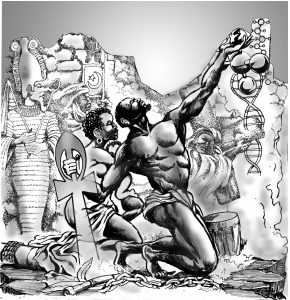An Odyssey to fulfil self-awareness in a plural culture space
THERE is a disregard in Guyanese society with respect to the Afro-descendant, birthed from a decadent, convoluted historical perspective towards the spheres of our humanity. Especially the value and significance of our historical memory, this is not only an undercurrent consensus of non-Afro-Guyanese, but many perceived as within the fold; who are indoctrinated to the point where they will arrive at an instant betrayal at the slightest urging- especially if lured by some promise concerning a job or position. At the launch of the Kuru Kuru college in 1973, Prime Minister Forbes Burnham was present. He gave an official speech then conducted a discourse with us pioneers. Our Cooperative society Kuru Kuru Agro-Industrial Young Settlers Co-op (KAYS) was also launched. I must state that it involved Afro-, Indo- and Indigenous Guyanese.
The prime minister’s first chat consisted of a protest artwork I had done, which I have written about before, but the most intriguing and symbolic feature was when he told a group of us that we must be aware of the following, and understand when they appear. He identified them as “Golliwags with credentials; waving their credentials to intimidate and impress you and will, in the end, betray you.” Most of us were clueless of what he was talking about. Like most young Guyanese I had read the primary library books of ‘Noddy and Big Ears’ that included Mr and Mrs Gollywag, never realising that this was a stereotype of the Afro and non-white presence in English society.
Even though the image was absorbed and remained a feature in my mind, it came in full reality much later while working and trained at the Walter Roth Museum of Anthropology with Dr. Denis Williams. There, I became aware of the ‘Colonial’ defined as a soul who has developed a dislike of self, based on misguiding education and doctrine that has instructed him/her of a uselessness of their own origins, making him/her feel saved by the scorned accommodation of the condescending oppressive culture. The colonial is in permanent denial of its own talents, ideas, abilities, judgements or right to independence. The colonial is comfortable with any menial status and praise even if deep down it realises its mockery it will assure itself that the praise is real.
In a plural society such as Guyana, some people have all had different origins and experiences, and some are haunted by greater historical demons and flashbacks than others that have shaped a unique mind-set of values propelled by centuries of deprivations and humiliations. Values that transcend the principles of the scale lower than we who experienced the effects of the transatlantic slave-trade. Thus knowledge of self and our neighbours across the street will help to understand, engage or protect ourselves from surprising and unexpected actions and outbursts and to understand the complexes and fictions that are manipulated in the first place to create the psychological and cultural launching pad for group enmity and callous manipulation. It is not by error that Afro-Guyanese and Indigenous people the targets, both are off course peoples whose stories and memories reach back to the foundations of the nation and are linked by blood. Thus, to dismiss that heritage would leave space for false reconstructions and assertiveness along political lines, not cultural, because those groups represent the cultural ethos to a greater percentage.
Emancipation was not celebrated with pomp and praises of gratitude to God by all alive when it occurred in 1834. Others grimaced from deep down inside at the next option of labour that had to be paid, that would demand medical accommodations along with systems of how daily employment would be so constructed. Most of all, no longer could restrictions of movement be implemented on the freed Africans, if while enslaved, his thriftiness had enabled them to plant their gardens after a day from six to six on the plantation, reap and journey to the slave market on Sunday, sell and save to eventually in cooperative groups purchase plantations. Then as freemen and women, how could they be restrained, no doubt entered the minds of the plantocracy.
The freemen were initially employed on the plantations as labour, the first struggle for workers rights began in 1842, and was supported by African Indentured labourers from Sierra Leone. The contentions were allowances for food and medicines that were denied, in 1848 anther strike was launched, that included taxes, which were paid in agreement towards drainage works in the villages, but was diverted to bring more Indentured labour from India and Portugal who did not support the strike, this was a concept unknown to both these latter Indentured groups, nor could the African villagers imagine the state of existing in the lands from whence these Indentured labourers were brought from, but significantly the hardest treachery to the villagers were the non-support of their struggle in 1848 by the very Christian churches who vied for their souls. Today ours is the self task to know and be aware of the past, not to live in it, but to attach those struggles and gains made to your consciousness and the contemporary land that those contributions shaped into modern Guyana.
The 2020 Elections must be seen as an effort to steal fruit from the tree of life of Emancipation by the new age international colonisers and their local sycophants. This is a record we must hold sacred, as we must hold in equal consciousness all that is involved, beneath the anthem that Black Lives Matter(BLM) across the Americas. What is happening in Guyana is part of the global anatomy of BLM and deserves an extensive narrative against the thrust that all lives matter. It will be told.



.jpg)









